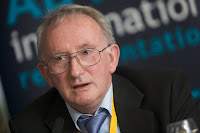 This week I’ve been at the Liberal Democrat Party Conference where the word on every party spokesperson’s lips has been ‘localism’. “There’s been too much central control and not enough local freedom,” they tell us.
This week I’ve been at the Liberal Democrat Party Conference where the word on every party spokesperson’s lips has been ‘localism’. “There’s been too much central control and not enough local freedom,” they tell us.In the health system, the Lib Dem party spokespeople want to slash central targets and give local health professionals more say. But what does this mean for people affected by Parkinson’s?
We already see huge variations in the service people get, depending on where they live - so with no central drive to get national quality standards for Parkinson’s and other neurological services implemented, won’t inequalities get even worse?

That was the hot topic for our fringe event at the conference called “From Whitehall to the town hall – no longer a national health service?”
Val Buxton is Director of Policy, Campaigns and Information at the Parkinson’s Disease Society







